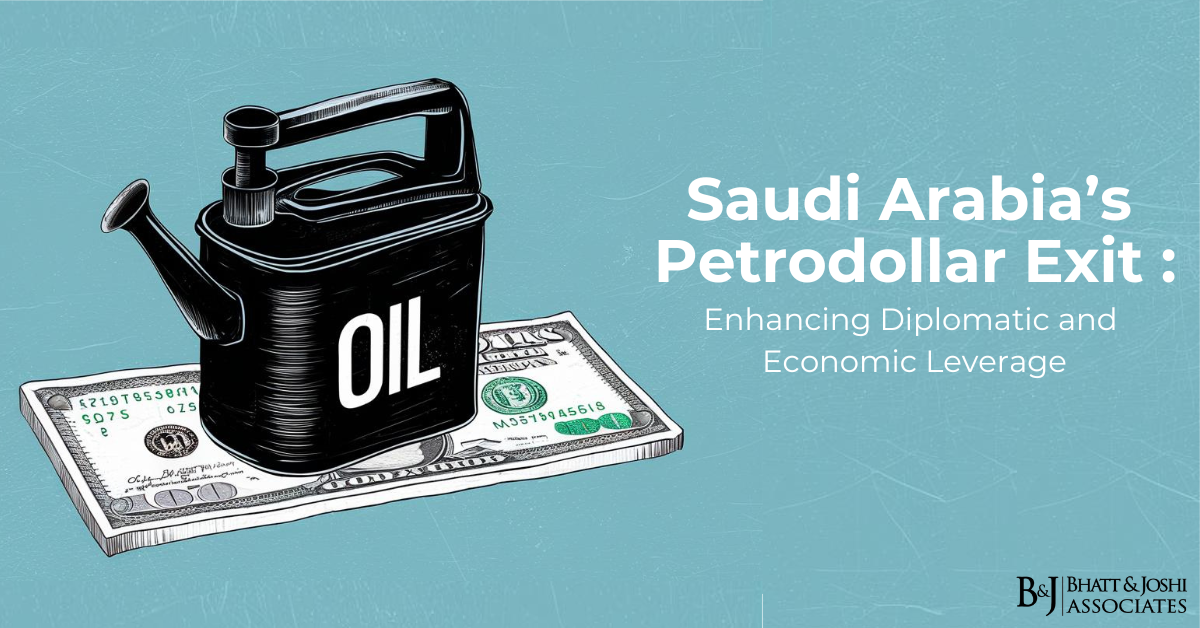Saudi Arabia’s Petrodollar Exit: Enhancing Diplomatic and Economic Leverage
Introduction
Background on the Petrodollar System
The petrodollar system emerged in the 1970s when the United States and Saudi Arabia agreed to price oil exclusively in U.S. dollars. This system bolstered the dollar’s status as the world’s primary reserve currency, ensuring a steady demand for dollars and integrating the global oil market with U.S. economic interests. For decades, this arrangement has influenced global trade dynamics and cemented the dollar’s central role in the international financial system.
Factors Leading to Saudi Arabia’s Petrodollar Exit
Global Economic Shifts
The Russia-Ukraine war has had profound effects on global energy markets. The conflict led to significant disruptions and volatility, pushing oil prices to around $130 per barrel in March 2022. This price surge created opportunities for oil-exporting countries to capitalize on higher revenues. Saudi Arabia, witnessing these dynamics, saw a strategic advantage in diversifying its currency usage for oil sales to mitigate similar future shocks and enhance economic stability (Atlantic Council, 2022; Carnegie Endowment for International Peace, 2022).
Strategic Alliances and Economic Diversification
Saudi Arabia’s growing economic ties with China and other BRICS nations played a crucial role in its decision. The kingdom’s membership in BRICS, alongside countries like Russia, China, India, and South Africa, aligns with its broader strategy of reducing dependence on Western financial systems. Projects like Project mBridge, which explore multicurrency digital platforms, also underscore Saudi Arabia’s commitment to diversifying its economic alliances and financial operations (Al Arabiya, 2024; Economic Confidential, 2024).
Benefits of Saudi Arabia’s Petrodollar Exit
Economic Flexibility and Stability
By trading in multiple currencies, Saudi Arabia reduces its reliance on the U.S. dollar, mitigating risks associated with dollar fluctuations. This economic flexibility ensures more stable revenue streams and allows Saudi Arabia to better navigate global financial uncertainties.
Strengthening Trade Relationships
Negotiating country-specific and currency-specific trade terms strengthens bilateral relations with major trading partners. For instance, trading oil in Chinese RMB or Indian Rupees not only facilitates smoother transactions but also enhances economic cooperation with these significant markets, fostering stronger, more resilient trade partnerships.
Enhanced Bargaining Power
Accepting multiple currencies improves Saudi Arabia’s market position by making its oil more attractive to a broader range of buyers. This flexibility can lead to more favorable trade terms, such as better pricing, supply stability, and increased foreign investments in Saudi infrastructure and technology.
Diplomatic Leverage
Political Independence
Reducing reliance on the U.S. dollar grants Saudi Arabia greater freedom in its foreign policy. This independence allows the kingdom to pursue its strategic interests without being overly influenced by U.S. economic and political pressures, thus enhancing its diplomatic clout on the global stage.
Strategic Neutrality
In the context of global geopolitical tensions, particularly between the U.S., China, and Russia, Saudi Arabia’s ability to trade in multiple currencies allows it to maintain a more neutral and strategic position. This neutrality can be leveraged to balance relationships with competing global powers, thereby maximizing Saudi Arabia’s geopolitical influence.
Case Studies
Russia’s De-dollarization Efforts
Russia’s strategies to promote trade in local currencies serve as a model for Saudi Arabia. Post the Ukraine invasion, Russia has increased the use of its ruble in international transactions, encouraging trade partners to adopt similar practices. This has helped Russia mitigate the impact of Western sanctions and maintain economic stability, demonstrating the benefits of de-dollarization (Carnegie Endowment for International Peace, 2022).
China’s Belt and Road Initiative
Saudi Arabia’s alignment with China’s economic policies, particularly through the BRICS framework, enhances its strategic position. Collaborative projects and investments facilitated by this partnership, such as infrastructure development under the Belt and Road Initiative, exemplify how diversified economic alliances can bolster Saudi Arabia’s global influence (Economic Confidential, 2024).
Future Implications
Impact on Global Financial Systems
As more countries follow Saudi Arabia’s lead in de-dollarization, the dominance of the U.S. dollar in global trade may diminish. The rise of alternative currencies and digital payment platforms could transform international financial systems, promoting a more multipolar economic order.
Saudi Arabia’s Role in Global Trade
Saudi Arabia’s exit from the petrodollar system positions it as a pivotal player in shaping the future of global trade. Its ability to influence economic trends and trade practices through diversified currency use and strategic alliances will be critical in the evolving international landscape.
Conclusion on Saudi Arabia’s Petrodollar Exit
Saudi Arabia’s decision to exit the petrodollar system marks a significant shift in global economic dynamics. By embracing multiple currencies and strengthening strategic alliances, the kingdom enhances its diplomatic and economic leverage. This move not only fosters greater stability and flexibility for Saudi Arabia but also sets the stage for a new era in global trade and diplomacy, where diversified financial systems and strategic neutrality play increasingly vital roles.
 Whatsapp
Whatsapp


